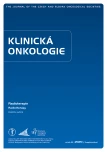Nutrition during radiotherapy of cancer patients
Authors:
E. Kocmanová 1,2
Authors‘ workplace:
Klinika radiační onkologie, Masarykův onkologický ústav, Brno
1; Klinika radiační onkologie, LF MU, Brno
2
Published in:
Klin Onkol 2020; 33(Suppl 1): 27-30
Category:
Review
doi:
https://doi.org/10.14735/amko2020S27
Overview
Background: Nutritional status plays an important role in cancer patients. It affects the progression of the disease as well as the tolerance and effectiveness of the treatment. A significant proportion of oncological diseases leads to anorexia and weight loss. Therefore, it is essential to perform nutritional screening in all cancer patients. Consequently, if a risk of malnutrition is identified, a nutrition specialist is to be consulted to implement measures in order to improve the nutritional status of the patient. The patient is advised on the suitability of specific foods. It is possible to introduce sip feeding of nutritionally balanced pharmaceutical products between meals. If the patient is unable to swallow, it is essential to proceed with enteral nutrition by gastrostomy or jejunostomy which are introduced prior to the oncological treatment. In case of disrupted intestinal absorption, parenteral nutrition via a central venous catheter or a venous access port is required.
Purpose: Nutritional screening is an important part in all cancer patiens to ascertain adequate nutrition during and after treatment.
Conclusion: The review includes the most important basics of nutrition for radiation oncologists.
Keywords:
enteral nutrition – anorexia – tumor cachexia
Sources
1. Tomíška M. Výživa onkologických pacientů. Praha: Mladá fronta 2018 : 33–551.
2. Bureš J, Horáček J, Malý J et al. Vnitřní lékařství. Praha: Galén 2014 : 969–990.
3. Klener P et al. Vnitřní lékařství. Praha: Galén 1999 : 680–702.
4. Sláma O, Sochor M. Paliativní péče jako součást komplexní onkologické péče. Postgraduální medicína 2014; 16 (3): 335–337.
5. Tuček Š, Tomášek J. Význam nutriční péče v onkologii. Postgraduální medicína 2014; 16 (3): 329–334.
6. Kohout P, Kotrlíková E. Základy klinické výživy. Praha: Agentura KRIGL 2005 : 9–74.
7. Křížová J, Křemen J, Kotrlíková E et al. Enterální a parenterální výživa. Praha: Mladá fronta 2014 : 12–62.
8. Urbánek L et al. Výživa v klinické praxi. Brno: NCONZO 2008 : 9–68.
9. Marek J et al. Farmakoterapie vnitřních nemocí. Praha: Grada Publishing 2005 : 579–600.
10. Sobotka L, Tomíška M. Výživa a metabolismus. Postgraduální medicína 2007; 9 (8): 860–909.
11. Informační systém léčivých přípravků 2020. [online]. Dostupné z: https: //www.aislp.cz/.
12. Šachlová M. Výživa u onkologických nemocných. Klin Onkol 2003; 16 (1): 38.
Labels
Paediatric clinical oncology Surgery Clinical oncologyArticle was published in
Clinical Oncology

2020 Issue Suppl 1
- Possibilities of Using Metamizole in the Treatment of Acute Primary Headaches
- Metamizole at a Glance and in Practice – Effective Non-Opioid Analgesic for All Ages
- Metamizole vs. Tramadol in Postoperative Analgesia
- Spasmolytic Effect of Metamizole
- Metamizole in perioperative treatment in children under 14 years – results of a questionnaire survey from practice
-
All articles in this issue
- Onkologie využívá paprsky X už 125 let…
- Radiotherapy of patients with implantable electronical devices
- Gene therapy in radiation oncology
- Spatial patterns of glioblastoma failure related to contouring strategy of adjuvant radiotherapy (RTOG vs. EORTC target volumes approach): clinical trial introduction
- Nutrition during radiotherapy of cancer patients
- Radiobio logical aspects of re-irradiation and their modelling in the determination of the tolerance dose in organs at risk
- The role of radiation therapy in rectal cancer
- Secondary tumors and radiotherapy
- Diet and its effect on prostate cancer, with a focus on plant-based diet
- Cyberknife boost 5–10 Gy for advanced nasopharyngeal cancer
- TSEI in patients with mycosis fungoides – clinical results
- Hypofractionated radiotherapy for prostate cancer
- Clinical Oncology
- Journal archive
- Current issue
- About the journal
Most read in this issue
- Secondary tumors and radiotherapy
- Nutrition during radiotherapy of cancer patients
- Diet and its effect on prostate cancer, with a focus on plant-based diet
- TSEI in patients with mycosis fungoides – clinical results
